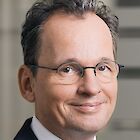An essential factor:
International specialists
The facts are well-known. In Germany, the number of people in need of care is growing. According to the Federal Statistical Office, over 280,000 more nurses will be needed by as soon as 2049. At the same time, many Baby Boomers will soon retire, without enough young people joining the labor market to replace them. Because of this, more and more industries are suffering from difficult shortages of trained professionals. It will not be possible to close this gap in the future without an influx of specialists from elsewhere. The number of applications to have international professional degrees recognized in Germany is increasing. Most of these applications are for healthcare professions, however new applications are also increasing for non-regulated professions facing large shortfalls, like for electronics technicians and chefs.

A long journey
More and more often, specialists are coming from third states outside the EU, as other EU nations are also facing the same shortages. They come to Germany in different ways.
Large healthcare and nursing companies conduct targeted searches for nurses in third states, often supported by service providers with a local network. Nuremberg Hospital, one of Europe's largest municipal hospitals, is one example. Since 2019, the team in Middle Franconia has included multiple nurses recruited from abroad. Tanya Porter, the Head of the International Department, and her team are working in nine countries around the world. It is important to her to look for specialists in countries with large populations, or with an excess of trained nurses, such as China or India. The situation is similar at Victor’s Group, which operates over 120 nursing homes throughout Germany and which has been active on the international applicant market since 2016. “We started working via personal networks, then we professionalized our recruiting more and more and added external cooperating partners” explains Daniel Klein, Head of the Human Resources International department.
Daniel Klein
“We started working via personal networks, then we professionalized our recruiting more and more and added external cooperating partners”
Daniel Klein, Head of the Human Resources International department, Victor’s Group
Employers in the healthcare sector often already have extensive experience in international recruiting. “They sometimes take a very systematic approach to recruiting new employees abroad. Generally, sectors organized into smaller companies cannot do this” explains Prof. Dr. Bernhard Boockmann, Scientific Director at the Institute for Applied Economic Research in Tübingen.
In smaller companies, there is often a bit of luck at play when determining how to find international employees, and in what countries. This was the case at Elektro Breitling, a service provider in the electrical and IT field with over 250 employees. The mid-sized company received an application from Bosnia for the first time in 2016. The over 20 international electricians whom CEO Jörg Veit has hired since then also come from Western Balkan countries and Croatia. This is simply because many employment relationships result from employee recommendations. “This is the way we receive most good applications from abroad” says Jörg Veit. “We do a lot of work on integration, and word gets around.” Employers in the healthcare sector see the same trend: When multiple nurses from one country work at an institution, there is a certain pull-effect from these countries. However, this desired effect is by no means automatic.




























